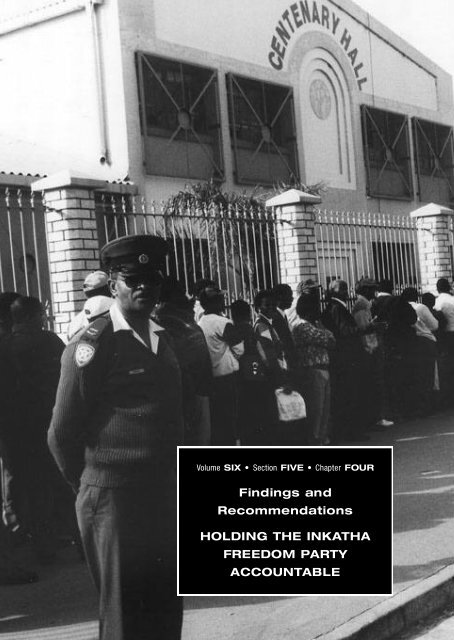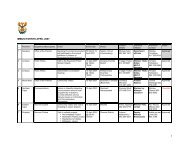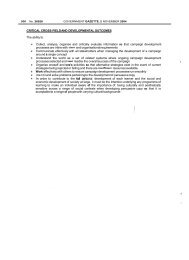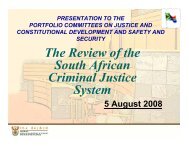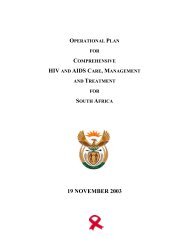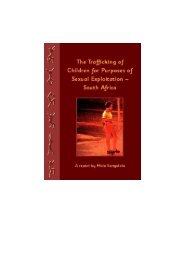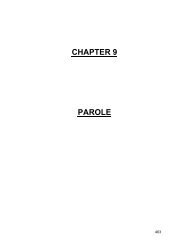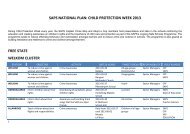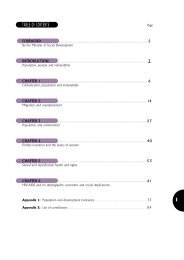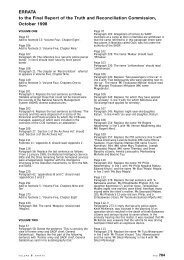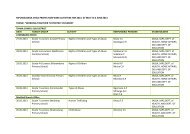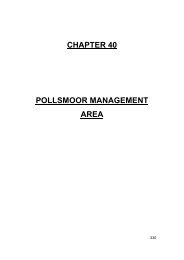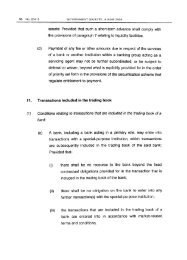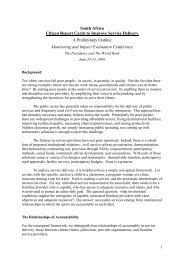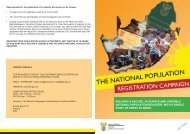Holding the IFP Accountable - South African Government Information
Holding the IFP Accountable - South African Government Information
Holding the IFP Accountable - South African Government Information
Create successful ePaper yourself
Turn your PDF publications into a flip-book with our unique Google optimized e-Paper software.
Vo l u m e SIX • S e c t i o n FIVE • C h ap t e r FOUR<br />
Findings and<br />
R e c o m m e n d a t i o n s<br />
HOLDING THE INKAT H A<br />
FREEDOM PARTY<br />
A C C O U N TA B L E
Vo l u m e SIX S e c t i o n FIVE C h ap t e r F O U R<br />
<strong>Holding</strong> <strong>the</strong> Inkatha<br />
F reedom Party <strong>Accountable</strong><br />
1. In its Final Report, <strong>the</strong> Truth and Reconciliation Commission (<strong>the</strong> Commission)<br />
made findings against <strong>the</strong> Inkatha Freedom Party (<strong>IFP</strong>) and associated struct<br />
u res and institutions. In particular, it found against <strong>the</strong> <strong>IFP</strong> that:<br />
The <strong>IFP</strong> was responsible for <strong>the</strong> commission of gross violations of human rights<br />
in <strong>the</strong> former Transvaal, Natal and KwaZulu, against persons who were perceived<br />
to be leaders, members or supporters of <strong>the</strong> UDF, <strong>the</strong> ANC or its alliance partners<br />
such violations formed part of a systematic pattern of abuse which entailed<br />
deliberate planning on <strong>the</strong> part of <strong>the</strong> organisation.<br />
2. The Commission based this finding on, inter alia:<br />
a speeches by <strong>the</strong> IPF president and senior party officials that had <strong>the</strong> effect<br />
of inciting supporters of <strong>the</strong> <strong>IFP</strong> to commit acts of violence;<br />
b <strong>the</strong> arming of <strong>IFP</strong> supporters in contravention of existing legislation;<br />
c mass attacks by <strong>IFP</strong> supporters on communities and leaders of <strong>the</strong> United<br />
Democratic Front (UDF) and/or <strong>the</strong> <strong>African</strong> National Congress (ANC);<br />
d collusion with <strong>the</strong> <strong>South</strong> <strong>African</strong> govern m e n t ’s security forces to commit<br />
violations; in particular, a pact with <strong>the</strong> <strong>South</strong> <strong>African</strong> Defence Force (SADF)<br />
to create a paramilitary force for <strong>the</strong> organisation with <strong>the</strong> intention of<br />
causing death and injury to UDF/ANC members;<br />
e <strong>the</strong> establishment of a hit squad within <strong>the</strong> KwaZulu Police and <strong>the</strong> Special<br />
Constable structure of <strong>the</strong> SAP with <strong>the</strong> intention of causing death or injury<br />
to UDF/ANC supporters;<br />
f training large numbers of <strong>IFP</strong> supporters, under <strong>the</strong> auspices of <strong>the</strong> Self-<br />
P rotection Project, with <strong>the</strong> objective of preventing <strong>the</strong> holding of elections in<br />
April 1994 by violent means;<br />
g conspiring with right-wing organisations and former members of <strong>the</strong><br />
g o v e rn m e n t ’s security forces to commit acts that resulted in loss of life or<br />
i n j u r y, and<br />
h c reating a climate of impunity by expressly or implicitly condoning gross<br />
human rights violations and o<strong>the</strong>r unlawful acts committed by members of<br />
<strong>the</strong> <strong>IFP</strong>.<br />
V O L U M E 6 S E C T I O N 5 C H A P T E R 4 P A G E 6 7 3
3. The Commission made fur<strong>the</strong>r findings against several groups aligned to <strong>the</strong> <strong>IFP</strong>:<br />
Caprivi trainees<br />
4. The Commission found that, in 1986, <strong>the</strong> SADF conspired with Inkatha to<br />
p rovide <strong>the</strong> latter with a covert, offensive paramilitary unit (‘hit squad’) to be<br />
deployed illegally against persons and organisations perceived to be opposed<br />
to or enemies of both <strong>the</strong> <strong>South</strong> <strong>African</strong> government and Inkatha. The SADF<br />
p rovided training, financial and logistical management and behind-<strong>the</strong>-scenes<br />
supervision of <strong>the</strong> trainees who were trained by <strong>the</strong> Special Forces unit of <strong>the</strong><br />
SADF on <strong>the</strong> Caprivi Strip.<br />
5. The Commission found that this illegal deployment of <strong>the</strong> Caprivi trainees led to<br />
g ross violations of human rights, including killing and attempted killing, for<br />
which it found former President PW Botha, General Magnus Malan and Dr MG<br />
Bu<strong>the</strong>lezi accountable.<br />
KwaZulu Police<br />
6. The Commission found that <strong>the</strong> KwaZulu Police (KZP), in <strong>the</strong> period 1986 to<br />
1994, acted in a biased and partial manner and overwhelmingly in fur<strong>the</strong>rance<br />
of <strong>the</strong> interests of Inkatha, and later <strong>the</strong> <strong>IFP</strong>, in that:<br />
a t h rough acts of commission, it worked openly with Inkatha, and through acts<br />
of omission, it failed to protect or serve non-<strong>IFP</strong> supporters;<br />
b it was responsible for large numbers of politically motivated gross human<br />
rights violations (killings, attempted killings, incitement and conspiracy to kill,<br />
s e v e re ill-treatment, abduction, torture and arson), <strong>the</strong> victims of which were<br />
almost exclusively non-<strong>IFP</strong> members;<br />
c it neglected to observe basic investigative pro c e d u re s ;<br />
d it deliberately tampered with evidence;<br />
e it ensured that KZP and <strong>IFP</strong> suspects in political violence matters were<br />
concealed, often for lengthy periods, in KZP and SADF camps;<br />
f it issued false police certificates and identity documents to members of <strong>the</strong><br />
<strong>IFP</strong> who were involved in political violence, in order to prevent <strong>the</strong>ir arrest<br />
and convictions and to facilitate <strong>the</strong>ir continued criminal activities; and<br />
V O L U M E 6 S E C T I O N 5 C H A P T E R 4 P A G E 6 7 4
g it took part in killings and purported to investigate <strong>the</strong> very matters in<br />
which its members had been involved as perpetrators.<br />
7 . In conclusion, <strong>the</strong> Commission found that, although <strong>the</strong>re were honourable<br />
exceptions in that some members of <strong>the</strong> KZP did carry out <strong>the</strong>ir duties in an<br />
unbiased and lawful manner, <strong>the</strong> KZP generally was characterised by incompetence,<br />
brutality and political bias in favour of <strong>the</strong> <strong>IFP</strong>, all of which contributed to<br />
<strong>the</strong> widespread commission of gross human rights during <strong>the</strong> period under review.<br />
Special Constables<br />
8. The Commission found that <strong>the</strong> Special Constables were deliberately established<br />
and trained to assist Inkatha against <strong>the</strong> latter’s political enemies, and that<br />
Special Constables, acting alone and in concert with Riot Unit 8 of <strong>the</strong> SAP,<br />
regularly committed serious unlawful acts in order to support and assist Inkatha<br />
in <strong>the</strong> period prior to and during <strong>the</strong> so-called ‘seven-day war’.<br />
Esikhawini hit squad<br />
9. The Commission found that, in 1990, senior members of <strong>the</strong> <strong>IFP</strong> conspired with<br />
senior members of <strong>the</strong> KZP to establish a hit squad in Esikhawini Township near<br />
Empangeni, Natal, to be deployed illegally against people perceived to be<br />
opposed to <strong>the</strong> <strong>IFP</strong>. The hit squad consisted of Caprivi trainees and members of<br />
<strong>the</strong> KZP. Its members took instructions from senior members of <strong>the</strong> <strong>IFP</strong> and of<br />
<strong>the</strong> KZP to eliminate political activists affiliated to <strong>the</strong> ANC and <strong>the</strong> Congress of<br />
<strong>South</strong> <strong>African</strong> Trade Unions (COSATU), as well as members of <strong>the</strong> SAP who<br />
w e re seen not to be supportive of <strong>the</strong> <strong>IFP</strong>.<br />
S e l f - p rotection unit members<br />
10. The Commission found that <strong>IFP</strong> self-protection unit (SPU) project, although<br />
o fficially placed within <strong>the</strong> ambit of <strong>the</strong> Peace Accord and containing an element<br />
of self-protection, was also intended to furnish <strong>the</strong> <strong>IFP</strong> with <strong>the</strong> military<br />
capacity to prevent by force <strong>the</strong> central government and <strong>the</strong> Tr a n s i t i o n a l<br />
Executive Council (TEC) from holding elections which did not accommodate <strong>the</strong><br />
I F P ’s desires for self-determination. Such armed resistance entailed <strong>the</strong> risk of<br />
unlawful death and injuries to persons.<br />
V O L U M E 6 S E C T I O N 5 C H A P T E R 4 P A G E 6 7 5
RESPONSE TO THE COMMISSION’S FINDINGS<br />
11. The <strong>IFP</strong> criticised <strong>the</strong> Commission’s report and, in <strong>the</strong> parliamentary debate on<br />
<strong>the</strong> report held on 25 February 1999, Mr MA Mncwango of <strong>the</strong> <strong>IFP</strong> said of <strong>the</strong><br />
Commission that it:<br />
has remained stuck in <strong>the</strong> mind-set of <strong>the</strong> total onslaught against <strong>the</strong> <strong>IFP</strong> that is<br />
<strong>the</strong> legacy of yesterday’s politics. Its final report is a clumsily crafted anecdotal<br />
mythology through which it has sought to give credibility to yesterday’s liberation<br />
propaganda ... The final report of <strong>the</strong> TRC will be consigned to <strong>the</strong> dustbin of<br />
h i s t o ry . 67<br />
12. He suggested that <strong>the</strong> work of <strong>the</strong> Commission had been negatively affected by<br />
its bilateral origins as a political accommodation between <strong>the</strong> ANC and NP and<br />
consequently was ‘clueless’ in its analysis of ‘black-on-black conflict’, unlike its<br />
work in re g a rd to <strong>the</strong> white/black conflict.<br />
13. With re g a rd to findings made against Dr MG Bu<strong>the</strong>lezi, he said that <strong>the</strong><br />
C o m m i s s i o n ’s main source of information came from <strong>the</strong> ‘twisted’ confessions<br />
of people seeking amnesty who had told <strong>the</strong> Commission what it wanted to<br />
h e a r. He noted with re g a rd to <strong>the</strong> Caprivi and Esikhawini hit squad operatives:<br />
This distortion clearly happened in <strong>the</strong> testimony of discredited witnesses and<br />
self-confessed killers such as Daluxolu Mandlanduna Luthuli, Romeo Mbambo<br />
and Andries Nosenga, who are changing <strong>the</strong>ir versions of <strong>the</strong> facts of <strong>the</strong>ir<br />
crimes until <strong>the</strong>y concocted lies to implicate Minister Bu<strong>the</strong>lezi in <strong>the</strong>ir activities<br />
(interjections). In due course, all <strong>the</strong>se were proved to be lies.<br />
14. In respect of <strong>the</strong> findings made against Dr Bu<strong>the</strong>lezi as President of <strong>the</strong> <strong>IFP</strong> and<br />
former leader of <strong>the</strong> KwaZulu <strong>Government</strong>, Mncwango said that:<br />
While <strong>the</strong> TRC found no evidence of wrongdoing, or a specific violation of<br />
human rights by Dr Bu<strong>the</strong>lezi, it seeks to hold him accountable for <strong>the</strong> generic<br />
violation of human rights. This is legally obscene and morally repugnant. …. One<br />
is politically accountable when certain actions may be <strong>the</strong> consequence of <strong>the</strong><br />
policies adopted by a leader. But Minister Bu<strong>the</strong>lezi never adopted any policy o<strong>the</strong>r<br />
than non-violent passive resistance and <strong>the</strong> echoing demand for all-inclusive<br />
negotiations, which in <strong>the</strong> final analysis were exactly what caused <strong>the</strong> demise of<br />
apar<strong>the</strong>id and led to <strong>the</strong> birth of <strong>the</strong> new <strong>South</strong> Africa.<br />
67 Hansard, 25 February 1999, p. 7 7 .<br />
V O L U M E 6 S E C T I O N 5 C H A P T E R 4 P A G E 6 7 6
15. Mr Mncwango is not correct in his assertion that ‘<strong>the</strong> TRC found no evidence of<br />
w rongdoing, or a specific violation of human rights by Dr Bu<strong>the</strong>lezi …’. The<br />
Commission did in fact make findings against Dr Bu<strong>the</strong>lezi himself. The<br />
Commission found that Dr Bu<strong>the</strong>lezi knew that <strong>the</strong> Caprivi trainees were to be<br />
illegally deployed in an offensive manner against people perceived to be anti-<br />
Inkatha and was aware that such armed resistance would entail <strong>the</strong> risk of<br />
unlawful death and injury. He was held accountable for killings and attempted<br />
killings. The Commission also found that, with re g a rd to <strong>the</strong> SPUs and <strong>the</strong><br />
establishment of <strong>the</strong> Mlaba Camp in <strong>the</strong> 1993/4 pre-election period, one of <strong>the</strong><br />
aims of <strong>the</strong> training was to furnish Inkatha with <strong>the</strong> military capacity forcibly to<br />
p revent <strong>the</strong> holding of elections, and that Dr Bu<strong>the</strong>lezi was aware that such<br />
armed resistance would entail <strong>the</strong> risk of unlawful death and injury. The<br />
Commission found that <strong>the</strong> SPU project constituted a conspiracy to commit<br />
g ross human rights violations, for which, inter alia, Dr Bu<strong>the</strong>lezi was held<br />
accountable.<br />
16. In coming to its findings on Dr Bu<strong>the</strong>lezi’s involvement in <strong>the</strong> Caprivi trainee<br />
e x e rcise, <strong>the</strong> Commission had re g a rd to very substantial quantities of former<br />
State Security Council memoranda and documents, which re c o rded <strong>the</strong><br />
p ro g ress of <strong>the</strong> training project in significant detail. These documents, <strong>the</strong><br />
au<strong>the</strong>nticity of which was never challenged, established that senior SADF off i-<br />
cers (Lt. Colonel van Niekerk and Colonel van den Berg) met with Dr Bu<strong>the</strong>lezi<br />
on 31st October 1989. This was after <strong>the</strong> SADF had withdrawn from <strong>the</strong> Caprivi<br />
p roject. Van Tonder summarised this meeting in a report to a superior off i c e r<br />
( Vice Admiral Putter) as follows:<br />
The Chief Minister expressed his concern over <strong>the</strong> situation in Mpumalanga and<br />
<strong>the</strong> fact that he was losing <strong>the</strong> ‘armed struggle’. He re f e r red to <strong>the</strong> ‘cell’ idea for<br />
offensive action, which did not get off <strong>the</strong> ground.<br />
17. At <strong>the</strong> same meeting Dr Bu<strong>the</strong>lezi expressed concern that he was:<br />
losing <strong>the</strong> armed struggle and in that regard emphasized that ‘offensive steps’<br />
w e re still a necessity; meaning <strong>the</strong> deployment of ‘hit squads’.<br />
18. Van Tonder was specifically subpoenaed by <strong>the</strong> Commission to comment on<br />
this report, and he confirmed his recollection of <strong>the</strong> meeting. He re c o rds Mr MZ<br />
Khumalo as saying that, at <strong>the</strong> very least, Dr Bu<strong>the</strong>lezi still re q u i red ‘cells’ capable<br />
of taking out undesirable members.<br />
V O L U M E 6 S E C T I O N 5 C H A P T E R 4 P A G E 6 7 7
19. Mr Mncwango went so far as to accuse one of <strong>the</strong> Commissioners, namely <strong>the</strong><br />
Revd Dr Khoza Mgojo, as having been ‘personally involved in supplying arms<br />
used in <strong>the</strong> seven-day war to <strong>the</strong> fighting units in Richmond’. According to Mr<br />
Mncwango, <strong>the</strong> late Mr Sifiso Nkabinde said in an affidavit that Dr Mgojo had<br />
‘used <strong>the</strong> Federal Theological Seminary (Fedsem) in Imbali as a stock facility for<br />
<strong>the</strong> weapons and he personally handed out <strong>the</strong>se weapons’. To date, no evid e n c e<br />
has been tendered to <strong>the</strong> Commission or to any o<strong>the</strong>r structure to support t h i s<br />
claim in any way.<br />
REVIEW PROCEEDINGS BROUGHT BY MINISTER BUTHELEZI AND<br />
THE <strong>IFP</strong><br />
20. Some two years after <strong>the</strong> publication of <strong>the</strong> Interim Report presented to <strong>the</strong><br />
P resident on 29 October 1998, Minister Mangosuthu Bu<strong>the</strong>lezi and <strong>the</strong> <strong>IFP</strong><br />
sought to review and set aside certain findings made by <strong>the</strong> Commission. They<br />
did so essentially on <strong>the</strong> basis that <strong>the</strong> findings in question were defamatory of<br />
Dr Bu<strong>the</strong>lezi and <strong>the</strong> <strong>IFP</strong>. They also complained of certain procedural irregularities.<br />
21. Originally <strong>the</strong> applicants sought an order recalling <strong>the</strong> Report and expunging<br />
<strong>the</strong> findings to which <strong>the</strong>y took offence. Although that relief was abandoned,<br />
<strong>the</strong>y sought an order compelling <strong>the</strong> Commission to publish in its final Report a<br />
statement setting out certain ‘errata’ and requiring <strong>the</strong> Commission to forward<br />
<strong>the</strong> errata to all parties to whom <strong>the</strong> Report has been distributed where this was<br />
practically possible.<br />
22. Dr Bu<strong>the</strong>lezi and <strong>the</strong> <strong>IFP</strong> (<strong>the</strong> Applicants) complained that some thirty-seven<br />
findings contained in <strong>the</strong> Commission’s Report – which implicated <strong>the</strong>m in gro s s<br />
human rights violations, criminality and conspiracy – could not have been based<br />
on factual and objective information. The Applicants also contended that <strong>the</strong><br />
Commission had failed to comply with fair pro c e d u res and did not aff o rd <strong>the</strong>m a<br />
p roper and appropriate opportunity to make re p resentations to it in respect of<br />
evidence in its possession and <strong>the</strong> findings it intended to make. The Applicants<br />
complained that <strong>the</strong> findings unjustifiably infringed <strong>the</strong>ir entitlement to a good<br />
name and reputation and have impaired <strong>the</strong>ir right to dignity and political activity<br />
f ree of unwarranted attack. They complained that <strong>the</strong> findings in question re p resented<br />
a failure by <strong>the</strong> Commission, its commissioners and employees to apply<br />
<strong>the</strong>ir minds to <strong>the</strong> evidence, as <strong>the</strong>re was no rational connection between <strong>the</strong><br />
factual evidence and <strong>the</strong> findings made.<br />
V O L U M E 6 S E C T I O N 5 C H A P T E R 4 P A G E 6 7 8
23. The Commission contended that <strong>the</strong> findings were justifiable and that <strong>the</strong>re had<br />
been no procedural unfairness. The Commission also contended that <strong>the</strong>re had<br />
been an unreasonable delay in launching <strong>the</strong> application and that no satisfactory<br />
explanation for <strong>the</strong> delay of two years had been furnished. A delay of this magnitude<br />
was especially serious in re g a rd to <strong>the</strong> nature of <strong>the</strong> mandate of <strong>the</strong><br />
Commission and its limited lifespan.<br />
24. It was apparent from <strong>the</strong> Applicants’ founding papers that <strong>the</strong>ir primary concern<br />
was <strong>the</strong> finding by <strong>the</strong> Commission that <strong>the</strong>y were implicated in <strong>the</strong> establishment<br />
of a covert offensive para-military unit (also re f e r red to as a ‘hit squad’) that was<br />
deployed against <strong>the</strong> political enemies of <strong>the</strong> Applicants. Indeed this was <strong>the</strong> only<br />
finding which was prominently attacked in <strong>the</strong>ir legal papers. The Commission<br />
contended that <strong>the</strong> findings in question were proper and, in <strong>the</strong> light of <strong>the</strong> oral and<br />
au<strong>the</strong>nticated documentary evidence and information on hand, beyond question.<br />
25. The Commission refused to change <strong>the</strong>se critical findings. It was, however,<br />
amenable to negotiation on <strong>the</strong> adjustment of certain lesser findings in order to<br />
facilitate settlement and <strong>the</strong> issue of its Codicil.<br />
26. The case was settled out of court only a few days before <strong>the</strong> matter was set<br />
down for hearing on 29 January 2003. The Commission agreed to <strong>the</strong> adjustment<br />
of certain lesser findings, such as those relating to <strong>the</strong> activities of certain gangs<br />
and <strong>the</strong> compilation of statistics derived from victim statements. With re g a rd to<br />
<strong>the</strong>se findings <strong>the</strong> Commission replaced findings against <strong>the</strong> <strong>IFP</strong> to read as<br />
findings against ‘members and/or supporters of <strong>the</strong> <strong>IFP</strong>’. The Commission has<br />
also adjusted similar findings in relation to <strong>the</strong> ANC and o<strong>the</strong>r role players.<br />
27. The bulk of <strong>the</strong> complaints advanced by <strong>the</strong> <strong>IFP</strong> and Minister Bu<strong>the</strong>lezi were<br />
rejected by <strong>the</strong> Commission. Its findings concerning Minister Bu<strong>the</strong>lezi’s<br />
accountability in his re p resentative capacity as <strong>the</strong> President of <strong>the</strong> <strong>IFP</strong>, <strong>the</strong> Chief<br />
Minister of KwaZulu and <strong>the</strong> only serving Minister of Police in <strong>the</strong> KwaZulu<br />
Police also remained undisturbed. The Commission was satisfied that <strong>the</strong>re was<br />
overwhelming evidence to support <strong>the</strong>se and o<strong>the</strong>r key findings concerning <strong>the</strong><br />
<strong>IFP</strong> and Minister Bu<strong>the</strong>lezi.<br />
28. As part of <strong>the</strong> settlement, <strong>the</strong> Commission agreed to publish an appendix in<br />
which <strong>the</strong> <strong>IFP</strong> and Minister Bu<strong>the</strong>lezi explained why <strong>the</strong>y disagreed with <strong>the</strong><br />
68 c o r e f indi ngs of a ga i nst <strong>the</strong>m.<br />
(...p680)<br />
68 See appendices to this ch a p t e r, b e l o w.<br />
V O L U M E 6 S E C T I O N 5 C H A P T E R 4 P A G E 6 7 9


